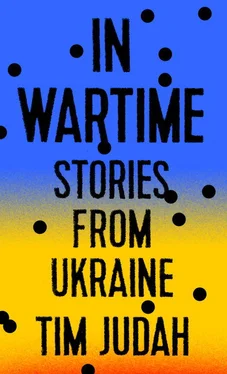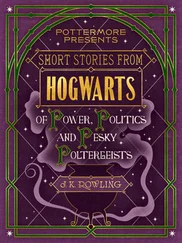Ukraine was like “a kit,” he explained, made artificially at Russia’s will and in accordance with Russia’s geopolitical interests. Ukraine existed only within its borders, which he was now at the forefront of redrawing, thanks to Russia. Now, America and the European Union had intervened and so it was time for Russia to take back what was “primordial” Russian territory from this “artificial” Ukrainian state from which others, such as Poland, Hungary and Romania, would also sooner or later be reclaiming chunks. And for that matter, he added, Ukraine’s recent leaders were not really Ukrainians at all, but people from the west of the country who were “by their genetics, Poles, Hungarians and Romanians, pursuing interests opposed to the interests of Ukrainians.”
Maybe Antyufeyev believed what he said about genetics. But does it matter? What matters is what the majority of Russians and Ukrainians believe about what is happening and why. And here is a depressing thought: in 1991 at the beginning of the Yugoslav wars foreigners were at a loss to explain how millions of people appeared to have become crazed, to have turned on their neighbors, and simply suspended their critical faculties. Milos Vasic, the great Serbian journalist, used to explain it like this: if the entire mainstream U.S. media were taken over by the Ku Klux Klan, it would not take long before Americans too would be crazed. People had TV sets for heads, he said. Almost a quarter of a century later, the internet and every other means of modern communication not only have not made things better but rather, have made them worse. Now there are even more ways to spread poison, lies and conspiracy theories.
Despite being such a big country, Ukraine, for most of us who live in the western part of the continent, is, or was, somewhere not very important. Is Odessa in Russia? It is on the Black Sea, yes, but my geography is a bit hazy there. They had that revolution a few years ago, led by that woman with the braids, didn’t they? What happened to her? How quickly those days have vanished. For too long Ukraine, the second-largest country in Europe after Russia, was one of the continent’s most under-reported places. For most of the last century, what little reporting in the foreign press there was, was done in the main by foreign correspondents living in Moscow, who inevitably absorbed some of the imperial and then former imperial capital’s patronizing attitudes. Now, with revolution and war, the interest of editors has inevitably been awakened, but most outlets still do not give journalists the space to make people and places really come alive.
The aim of this book is not to record a blow-by-blow account of events that led to the Maidan revolution of 2014, the annexation of Crimea or the war that has followed. Others have written that. Others will also write books which will answer who exactly gave the orders to shoot people on the Maidan during the revolution, the circumstances of the shooting down of Malaysia Airlines flight MH17 over rebel territory and how some forty-two anti-Maidan-cum-pro-Russians died in a fire in the Trade Unions House in Odessa in May 2014. This is not a history of Ukraine either, but I do write about what happened in Lviv and the west of Ukraine in the Second World War and look at the history of Donetsk because these two stories are key to understanding what is happening now. Each section of the book is a story in itself. Together they should give an impression of what Ukraine feels like, now, in wartime.
What I thought was that between journalism and academic books there was not much which explained Ukraine, that made it a vibrant place full of people who have something to say and to tell us. Wherever I went I found, as in few other places I have been, just how happy ordinary people were to talk. Then I understood that this was because no one ever asks them what they think. Often, when they started to talk, you could hardly stop them. If we listen to people we can understand why they think what they do, and act the way they do. In Ukraine (and not just in Ukraine of course, but across much of the post-communist world), people have been taken for granted for so long, as voters, or taxpayers or bribe payers, that when finally the rotten ship of state springs leaks and begins to list, everyone is shocked. But they should not have been. It was just that no one, especially in the West, was asking what was happening below deck. This book is about what I saw, what people told me and also those parts of history that we need to know in order to understand what is happening in Ukraine today.
Just Angry
The war began in the wake of the Maidan revolution. Russian propaganda holds, and quite possibly Russian leaders really do believe, that it was all a cleverly orchestrated Western coup. What they cannot see is that it was nothing of the sort. In reality there was no mystery. People were just angry. When President Yanukovych, after Ukraine’s years of work on preparing two key agreements which would begin the process of European integration, announced, on November 21, 2013, that the deals were off, he unwittingly lit the blue touch paper of revolt. For those who supported the revolution—and in the end hundreds of thousands came to demonstrate their support—it was hardly because they believed that the strictures of gradually implementing a dull-sounding Deep and Comprehensive Free Trade Area agreement with the EU was going to quickly change their lives, but it was something more fundamental, primal even. In a country rich enough to provide its inhabitants with very decent lives, the EU deals were seen as some sort of lifebuoy to grab on to. By linking their fate to the West, many thought that the gradual implementation of the agreements would create the thing that had been missing in their lives—a state of law. It may yet happen, as the agreements were indeed signed after the revolution, but it will be a long haul. Even if membership of the EU is not, at least for now, on the agenda, the agreements do foresee many of the same reforms gone through by all of the other former communist countries which have joined. They commit Ukraine to a process which is supposed to, and if the experience of the other former communist countries is anything to go by, would to a good degree transform and modernize its institutions. In that sense the Maidan revolution was a collective plea: “Save us from these people!” And likewise, while it was natural for many in the west and center to look westward for a savior, it was also natural for many in the east to look to Russia, because of their historic, ethnic, language, family and business ties. I am generalizing of course because the picture was not black and white—but it was not so complicated either. To a Westerner Ukraine seems very familiar on the surface, but, while obviously Western countries have all sorts of political, economic and social problems, on balance, and with the exception of countries such as Greece, which never went through the type of transformative process now required by the EU, they tend to pale in terms of what these problems mean for the individual Ukrainian.

A remnant of the Maidan revolution, Kiev. The car has a Ukrainian trident symbol inside the European stars. April 2014.
It is not right to compare Ukraine to Britain or Germany, or even the tiny Baltic states, but a serious point of departure is to be made with Poland, a country whose population size, at 38.5 million, is in the same ballpark as Ukraine’s. In 1990 the GDP per capita of both countries was similar, as were life expectancy rates. Just before the war began, Poland’s GDP per capita was more than three times greater than that of Ukraine and Poles could expect to live almost six years longer than Ukrainians. Likewise Russia’s GDP per capita, which started at more or less the same place, was some three and half times greater before the war, and while its life expectancy rate was virtually identical to Ukraine’s it had increased more than its neighbor’s since 1990. Ukraine was and is not a poor country, but the experience of Poland, and even that of the Baltic states rather than oil- and gas-rich Russia, suggested to what extent Ukrainians had been shortchanged by their leaders since independence and explained why they no longer wanted to continue hearing about their country’s potential rather than actually seeing and experiencing it.
Читать дальше













